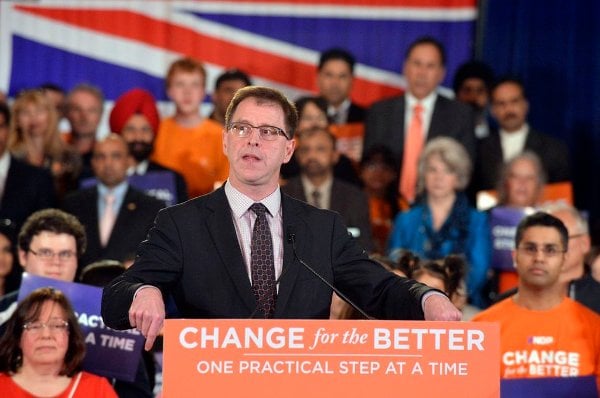New Democrats should not allow Adrian Dix to lead them into the next provincial election in British Columbia. Although Dix has many admirable qualities, he demonstrated bad judgment during the 2013 campaign. He has been branded -- deeply and unfairly -- as both untrustworthy and politically unsuccessful.
Hiring Brian Topp as campaign manager was just one mistake. In February 2013, just four days after Dix confirmed that Topp would be managing the provincial election campaign, a new public affairs company named Kool, Topp & Guy was launched in Toronto. Topp's new business partners were Ken Boessenkool, a long-time confidant of Stephen Harper who also served as Christy Clark's chief of staff, and Don Guy, the Ontario Liberal Party's three-time campaign manager and, more relevantly, head of the all-important communications component of this year's BC Liberal campaign.
The new business arrangement gave pause to some concerned about Topp's strategic compass. Fuelling that concern was Topp's November 2009 admission, in a self-penned article, that one year earlier he'd given a senior Conservative three days advance notice that the federal Liberals and New Democrats were negotiating a coalition agreement; an agreement that, with some element of surprise, could have toppled the Harper government. Given Topp's choice of new business partners four years later, were his political instincts really the best available to the BC NDP leading into so high stakes an election campaign?
Positively uninspiring
Another of Dix's mistakes was a so-called "positive" campaign that, in actual fact, served up the political equivalent of pabulum. Positive campaigning is supposed to be about conveying empathy and optimism, about connecting with potential voters and inspiring them to turn out. Dix's version was bland, impersonal and distinctly uninspiring.
Instead of banging on about "skills training," Dix should have been expressing the depth of his commitment to working families and conveying real enthusiasm about the 21st century jobs his government would create -- in sustainable forestry and fisheries, public transportation, information technology, the arts, tourism, environmental retrofits and carbon-free energy. Instead of trying to turn the environment into a process issue, he should have been talking about his love of nature and his deep concern for future generations -- and linking that empathy to his exciting vision of a vibrant, high-tech, sustainable economy. Dix's message could have been: "Yes we can have a thriving economy and a healthy environment, too."
Dix failed to provide the context and contrast that effective positive campaigns need. Barack Obama's success was leveraged on eight years of George W. Bush failures. Dix should have campaigned hard against the evisceration of BC Hydro, the scandal-ridden sale of BC Rail, the deceptive introduction of the HST, the gross inadequacies of health and seniors' care, and the appalling rate of child poverty.
Fatally flawed by memo incident
Worst of all, Dix failed to understand the centrality of image and personal narrative in 21st century politics. Who is Adrian Dix? What does his history and manner tell us about his character? These are questions that have a huge effect on how voters other than die-hard party faithfuls arrive at their decisions. As if oblivious to such factors, Dix chose not to use a teleprompter, was cavalier about his clothing, and refused to provide a personal backstory. Most voters never learned of Dix's immigrant and entrepreneurial parents or his chronic health challenge, for example.
Dix should have realized that his greatest vulnerability was the backdated memo that, in 1999, led to his firing as chief of staff to then premier Glen Clark. He should have addressed it openly and unequivocally from the outset of the campaign, before the Liberals could make it a defining issue. Instead, Dix treated the memo as yesterday's news, and seemed genuinely surprised when people paid serious attention to it.
Dix's late change of position on the Kinder Morgan Trans Mountain pipeline played directly into Christy Clark's hands. Opposing the pipeline expansion was not the problem: Tom Mulcair had taken that position five months earlier, saying the project could not be allowed to proceed in "the absence of a thorough, credible, complete [environmental] assessment process." Mulcair's announcement was well timed and generated no controversy, whereas Dix's announcement -- which came mid-campaign when his trustworthiness was already a major issue -- could not have been worse timed. Dix should have announced his position on Kinder Morgan in April 2012, at the same time that he came out against the Enbridge Northern Gateway pipeline. And he should have done so while articulating a visionary plan for 21st-century jobs.
Sadly, Dix has now been branded as a political failure. Had he been expected to lose, the damage might have been reparable. But the fall from a 20-point polling lead is long and hard, leaving the BC NDP with the political equivalent of Humpty Dumpty as their leader. Once ruptured, public expectations are difficult to reconstruct.
Get on with rebuilding
Currently, Dix is deflecting calls for accountability while preparing for a leadership review in November. Just one week after the election, he announced a "comprehensive review" of the campaign -- thus pre-empting a June meeting of the party's provincial council. BC NDP president Moe Sihota, whose fate is closely tied to Dix, has said the election loss should not create a "revolving door" on the leadership. And even as Dix was assuring party members that the review "will spare nothing and no one, least of all me," he made a point of referencing two other leaders, Ontario's Dalton McGuinty and Manitoba's Gary Doer, who came back from initial defeats to become premiers.
But the BC NDP has been hit by a hurricane rather than a hailstorm. Instead of a cosmetic paint job, the party needs to be knocked down to its foundations before rebuilding begins again. A leadership race is needed to turn the public memory away from the recent loss, to revitalize and grow the membership, and to get donations flowing again.
Fortunately, there is no shortage of exciting potential candidates for the leadership, including Nathan Cullen, George Heyman, John Horgan and Gregor Robertson.
Most of the party executive should also be replaced. It is time for a new generation of activists, organizers and visionaries: people whose primary credential is not that they served in a BC NDP government more than 13 years ago.
The future of progressive politics lies with the 20- and 30-year-olds who were on the frontlines of local riding campaigns, but have otherwise been held back by a stale and inbred party establishment. Inspirational, forward-looking young people have to be at the forefront of the next effort to modernize and grow.
As for Dix, he would do well to remember Thomas Berger, who defeated Dave Barrett in the 1969 BC NDP leadership race. With a healthy lead in the polls, Berger was widely expected to become British Columbia's first NDP premier. But wily W.A.C. Bennett called a snap election and, in the chaos that ensued, the BC NDP lost four seats.
Berger immediately resigned, a selfless act that enabled the party to re-set quickly and win the next election under Barrett's leadership. Berger, of course, went on to do great things, including the Mackenzie Valley Pipeline Inquiry that pioneered environmental impact assessment and aboriginal consultation, not just for Canada but the world.
Adrian Dix, too, has much to contribute. But first, he needs to do the right thing. He should step down in favour of an interim leader, who would serve until a new person is chosen to head the BC NDP. ![]()
Read more: Politics, BC Politics
















Tyee Commenting Guidelines
Comments that violate guidelines risk being deleted, and violations may result in a temporary or permanent user ban. Maintain the spirit of good conversation to stay in the discussion.
*Please note The Tyee is not a forum for spreading misinformation about COVID-19, denying its existence or minimizing its risk to public health.
Do:
Do not: